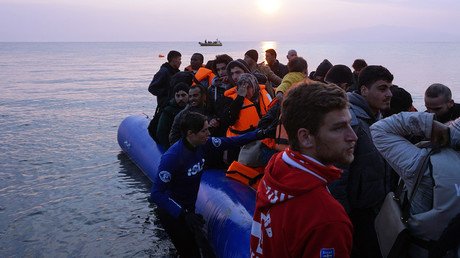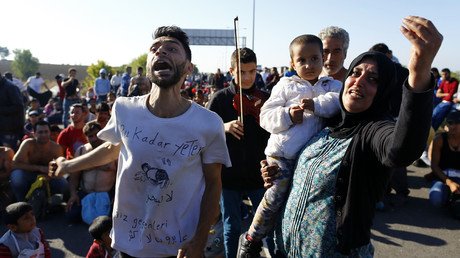Turkish mayor says Ankara failed to inform town of migrant camp, tourist area ‘lacks security’
Ankara has failed to notify local authorities that migrants from Greece are to arrive in the coastal town of Dikili as part of the controversial EU exchange deal, its mayor Mustafa Tosun told RT, adding that Dikili lacks necessary facilities and security.
Local authorities of Dikili, where the first boats with migrants traveling from Greece have recently reached the shore, had no idea about Ankara’s plans to send asylum seekers to the town, mayor Tosun said in an interview with RT.
“We have not been officially informed about the arrival of migrants by the country’s official institutions. So we are in the situation when we are making all the statements about the situation based on rumors,” he said.
The city doesn’t have enough facilities and infrastructure that could provide refugees with normal living conditions such as adequate housing or health service. Locating them in Dikili would obviously put strain on local residents, the mayor explained, adding that the people in the town “are not against refugees,” but “are against the situation.”
“Our hospitals are just enough for our citizens, when the refugees will come they will suffer from it as well as our citizens,” the mayor warned.
Apart from that, Tosun note that WHO data that says the city has recently seen an increase in seven diseases. The official Ankara, however, has turned a deaf ear to that information as well as to the opinions of NGOs and civil rights advocates who all expressed their concern over choosing Dikili as a place for a new refugee camp.
With almost no security system in the summer residences, standing empty during non-summer seasons, some of the migrants could easily break into them, he said.
One of such camps has been set up in Calais. It was the largest makeshift camp in Europe and has gradually turned into a small town with its own social life. However, the camp residents have been discontent with life conditions there. French residents of Calais have been complaining about lack of security. The French government recently decided to limit the size of the 'Jungle,' a temporary home to some 5,000 asylum seekers which has caused protests among the refugees and groups supporting them.
READ MORE: Almost 130 refugee kids vanish after 'Calais Jungle' demolition - charity
In winter the population of the resort town in the Izmir province is only 40,000 people, including the neighboring villages, according to the official. However, this number will go up to 400,000 by summertime. If central authorities confirm their decision to establish a refugee camp there, the situation may spiral out of control, he said.
“We already have a great lack of security, how would we take the necessary security measures when they put a refugee camp here?!” Tosun inquired.
The mayor condemned the so-called “one in, one out” EU plan to deport illegal Syrian migrants from Greece while resettling the same number of Syrians from Turkey to the EU.
"I am personally against one on one exchange as well as the exchange for money," Tosun said.
The deal sealed last month is aimed at setting up “a safe and legal” route to Europe. In return for its participation, Turkey has been promised more financial support and a visa-free regime with the EU.
Giorgos Kosmopoulos, head of Amnesty International in Greece, recently said Turkey is “not a safe country for refugees,” adding that “the EU and Greek authorities know this and have no excuse.”
Turkey, which is already the biggest host to refugees, is not prepared to accept that many people, Andrew Gardner, a Turkey researcher from Amnesty International told RT, stressing that, more importantly, “the deal itself is wrong, the deal is illegal, the deal is immoral.”
Apart from Turkey’s inability to provide refugees with sufficient supplies, there is “a continuing pattern of forced returns from Turkey [to Syria],” which is the biggest threat to the safety of failed asylum seekers.
If the EU had set up “safe and regular routes” to Europe, there would be no need for the illegal ones currently being used by people smugglers, Gardner noted. Now is the time for the countries that have done nothing to remedy the situation so far to do their part in accommodating Syrian refugees, he said.
Turkey has been forcibly returning around 100 Syrians per day back to their war-torn homeland, while ignoring the right of asylum seekers, research conducted by Amnesty International shows.
Currently, more than 4,000 migrants and refugees are being detained on the Greek islands of Lesbos and Chios, who are set to be sent back to Turkey.














